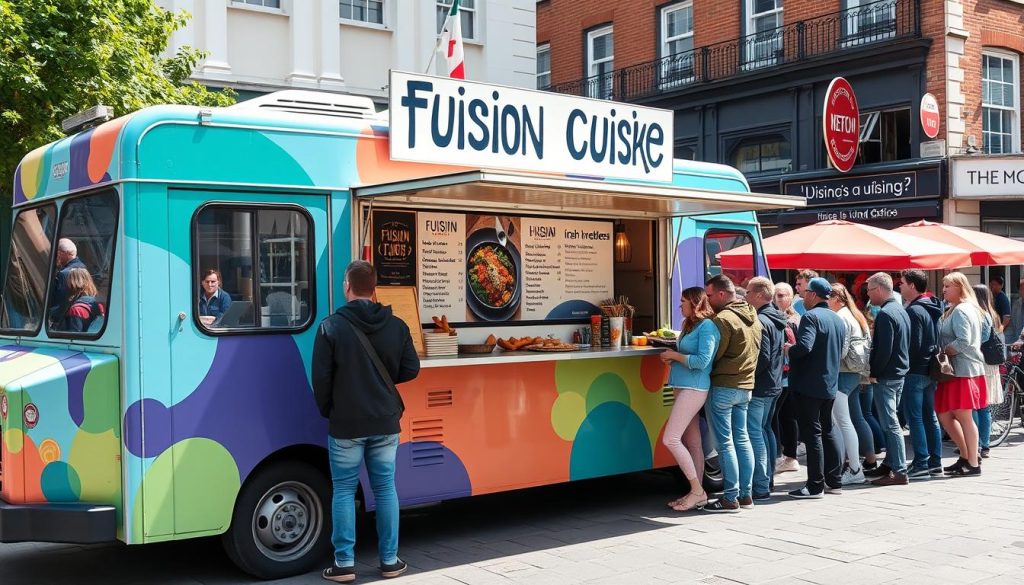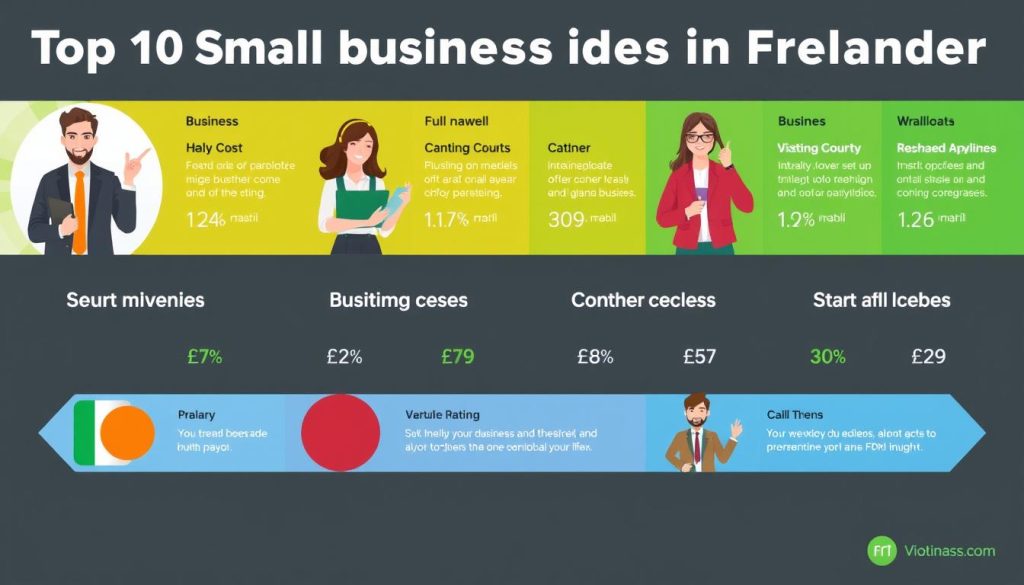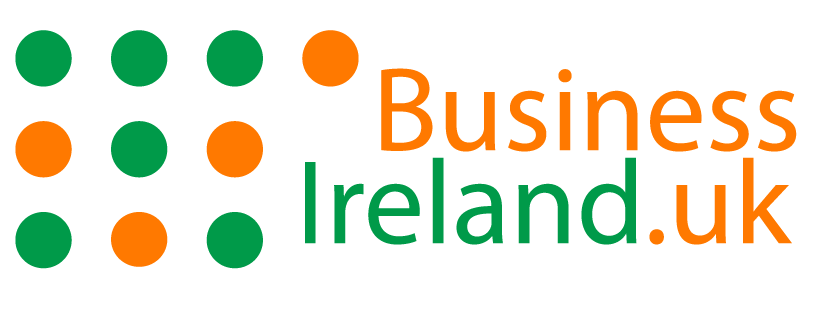Ireland has emerged as one of Europe’s most vibrant economies, offering a welcoming environment for foreign entrepreneurs. With its low corporate tax rate of 12.5%, business-friendly policies, and access to EU markets, the Emerald Isle presents numerous opportunities for foreigners looking to establish profitable ventures. This comprehensive guide examines the top 10 small business ideas in Ireland for foreigners, carefully selected based on market demand, startup requirements, and profit potential.
Whether you’re an EU citizen taking advantage of freedom of movement or a non-EU national seeking new horizons, these business ideas can help you navigate Ireland’s entrepreneurial landscape. We’ve analyzed each opportunity based on startup costs, revenue potential, necessary permits, and cultural adaptability to help you make an informed decision about your business journey in Ireland.
1. Tourism/Travel Guide Services
Ireland welcomed over 11.3 million overseas visitors in 2019 (pre-pandemic), with tourism contributing €9.3 billion to the economy. As international travel rebounds, specialized tour services catering to niche interests represent an excellent opportunity for foreigners with cultural insights and language skills.
Feature Stats
- Startup Costs: €5,000-€15,000
- Avg. Monthly Revenue: €3,000-€8,000
- Required Permits: Tour Operator License, Public Liability Insurance
Specifications
Pros
- Low barrier to entry with minimal regulatory requirements
- Leverages your unique cultural perspective and language skills
- Flexible working hours and scalable business model
- Can start part-time while building clientele
- Multiple revenue streams (tours, partnerships, online content)
Cons
- Seasonal fluctuations affect income stability
- Requires deep knowledge of Irish history and culture
- Competition from established tour operators
- Weather dependency for outdoor activities
- Initial marketing challenges to build reputation

Tourism businesses benefit from Ireland’s rich cultural heritage and natural landscapes. Successful operators often specialize in niche areas like literary tours, whiskey experiences, or adventure tourism. Starting with digital marketing and partnerships with accommodation providers can help establish your presence in this competitive but rewarding sector.
2. E-commerce (Irish Crafts Export)
The global demand for authentic Irish products continues to grow, particularly among the 70 million-strong Irish diaspora worldwide. An e-commerce business exporting Irish crafts, textiles, and artisanal products offers a scalable opportunity with relatively low startup costs.
Feature Stats
- Startup Costs: €8,000-€25,000
- Avg. Monthly Revenue: €4,000-€12,000
- Required Permits: Business Registration, Export License (for non-EU countries)
Specifications
- Recommended Locations: Any location with good logistics access
- Target Audience: Irish diaspora, tourists, international gift market
- Key Products: Woolen goods, crystal, pottery, jewelry, food products
Pros
- Location-independent business model
- Scalable with minimal staff requirements initially
- Leverages Ireland’s strong brand recognition
- Year-round sales potential
- Opportunity to build relationships with local artisans
Cons
- Requires understanding of international shipping regulations
- Inventory management challenges
- Building supplier relationships as a foreigner
- Competition from established retailers
- Currency exchange considerations

E-commerce businesses benefit from Ireland’s strong logistics infrastructure and EU membership. Success in this sector often comes from curating authentic products with compelling stories and creating efficient fulfillment systems. Platforms like Shopify make it relatively straightforward to establish an online presence, while partnerships with Irish craftspeople can provide unique inventory.
3. Food Truck (Fusion Cuisine)
Ireland’s food scene has evolved dramatically in recent years, with growing appreciation for international cuisines. A food truck offering fusion cuisine that combines Irish ingredients with international flavors presents an exciting opportunity for culinary entrepreneurs.
Feature Stats
- Startup Costs: €20,000-€50,000
- Avg. Monthly Revenue: €5,000-€15,000
- Required Permits: Food Business Registration, HACCP Certification, Trading License
Specifications
- Recommended Locations: Dublin, Cork, Galway, festivals, markets
- Target Audience: Urban professionals, tourists, festival-goers
- Popular Concepts: Irish-Asian fusion, Mediterranean-Irish, Latin-Celtic
Pros
- Opportunity to showcase your cultural cuisine
- Lower overhead than a traditional restaurant
- Mobility to test different locations and events
- Strong social media marketing potential
- Pathway to eventual brick-and-mortar establishment
Cons
- Strict food safety regulations
- Weather dependency affects business
- Seasonal fluctuations in demand
- Higher startup costs than some other options
- Competitive market in urban centers

Food trucks have gained popularity in Ireland’s urban centers, particularly at festivals, markets, and corporate events. Success in this industry often comes from creating a distinctive brand identity and menu that stands out in the market. Understanding Irish food preferences while introducing innovative fusion concepts can create a compelling offering that attracts both locals and tourists.
4. Freelance IT/Software Development
Ireland has established itself as a European tech hub, hosting operations for giants like Google, Facebook, and Microsoft. This creates substantial opportunities for freelance IT professionals and software developers to provide specialized services to both multinational corporations and local businesses.
Feature Stats
- Startup Costs: €2,000-€8,000
- Avg. Monthly Revenue: €4,000-€15,000
- Required Permits: Business Registration, Work Permit (for non-EU nationals)
Specifications
- Recommended Locations: Dublin, Cork, Galway (tech hubs)
- Target Audience: Tech startups, SMEs, multinational corporations
- In-Demand Skills: Web development, mobile apps, AI/ML, cybersecurity
Pros
- Low startup costs with high earning potential
- Strong demand for tech skills across industries
- Remote work possibilities
- Minimal language barriers in tech industry
- Networking opportunities with global tech companies
Cons
- Highly competitive market
- Need to continuously update skills
- Irregular income, especially when starting
- Building a client base takes time
- Tax complexities for freelancers

Ireland’s position as a tech hub makes it an ideal location for IT freelancers. Success in this field often comes from developing specialized expertise in high-demand areas and building a strong professional network. Industry events, tech meetups, and online platforms like LinkedIn are valuable for connecting with potential clients. Many freelancers start by working with smaller local businesses before expanding to larger corporate clients.
5. Language Tutoring
As Ireland’s economy becomes increasingly global, demand for language skills has grown substantially. Foreign entrepreneurs with strong language abilities can establish tutoring services catering to businesses, students, and professionals seeking to enhance their linguistic capabilities.
Feature Stats
- Startup Costs: €1,000-€5,000
- Avg. Monthly Revenue: €2,000-€6,000
- Required Permits: Business Registration, Teaching Qualification (recommended)
Specifications
- Recommended Locations: Dublin, Cork, university towns
- Target Audience: Business professionals, students, expatriates
- High-Demand Languages: Mandarin, Spanish, German, French, Arabic
Pros
- Directly leverages your native language skills
- Minimal startup investment required
- Flexible scheduling options
- Can combine in-person and online teaching
- Cultural exchange opportunities
Cons
- Income limited by available teaching hours
- Requires strong communication skills
- Seasonal fluctuations (academic calendar)
- Client retention challenges
- Competition from language schools and apps

Language tutoring businesses can be structured as one-on-one sessions, group classes, or corporate training programs. Many successful language tutors combine in-person teaching with online options to expand their reach. Creating specialized courses for business terminology, travel, or academic purposes can help differentiate your services in the market. Teaching certifications, while not always mandatory, can enhance credibility and command higher rates.
6. Eco-Friendly Product Retail
Ireland has seen growing consumer interest in sustainable and eco-friendly products. Opening a retail business specializing in environmentally conscious goods aligns with current market trends and appeals to increasingly eco-aware Irish consumers.
Feature Stats
- Startup Costs: €15,000-€40,000
- Avg. Monthly Revenue: €5,000-€12,000
- Required Permits: Business Registration, Retail License, Import Licenses (if applicable)
Specifications
- Recommended Locations: Dublin, Galway, Cork, affluent suburbs
- Target Audience: Environmentally conscious consumers, young professionals
- Popular Products: Zero-waste items, organic products, sustainable fashion
Pros
- Growing market with increasing consumer awareness
- Opportunity to introduce innovative products
- Strong community-building potential
- Alignment with EU environmental initiatives
- Potential for both physical and online retail channels
Cons
- Higher initial investment for inventory
- Supply chain challenges for truly sustainable products
- Price sensitivity among some consumer segments
- Need for extensive product knowledge
- Retail location costs in prime areas

Eco-friendly retail businesses can thrive by creating educational components alongside product sales. Many successful stores host workshops, maintain informative blogs, and build communities around sustainable living. A hybrid approach combining a physical store with e-commerce capabilities can maximize reach. Carefully vetting suppliers to ensure authentic sustainability credentials is essential for maintaining customer trust in this growing market segment.
7. Pet Care Services
Ireland has one of the highest rates of pet ownership in Europe, with approximately 61% of households having at least one pet. This creates substantial demand for quality pet care services, particularly in urban areas where busy professionals seek reliable care for their animal companions.
Feature Stats
- Startup Costs: €3,000-€20,000
- Avg. Monthly Revenue: €2,500-€8,000
- Required Permits: Business Registration, Insurance, Animal Care Certification (recommended)
Specifications
- Recommended Locations: Dublin, Cork, commuter towns
- Target Audience: Working professionals, families, elderly pet owners
- Service Options: Dog walking, pet sitting, grooming, training
Pros
- Low language barrier requirements
- Relatively low startup costs
- Flexible service offerings
- Potential for recurring revenue from regular clients
- Minimal regulatory hurdles
Cons
- Physical demands of the work
- Requires building trust in a personal service
- Insurance and liability considerations
- Weather challenges for outdoor services
- Irregular hours including weekends/holidays

Pet care businesses can start small with services like dog walking or pet sitting before expanding to more specialized offerings such as training or grooming. Building a strong online presence with client testimonials is crucial for establishing trust. Many successful pet care entrepreneurs use booking apps and create service packages to streamline operations. As the business grows, hiring additional staff or expanding to a physical location becomes possible.
8. Specialty Coffee Shop
Ireland’s coffee culture has evolved significantly in recent years, with growing appreciation for specialty coffee. Opening a unique café that combines quality coffee with distinctive cultural elements can create a compelling offering in the competitive Irish market.
Feature Stats
- Startup Costs: €50,000-€120,000
- Avg. Monthly Revenue: €8,000-€25,000
- Required Permits: Food Business Registration, Health & Safety Certification, Alcohol License (if applicable)
Specifications
- Recommended Locations: Dublin, Cork, Galway, university areas
- Target Audience: Young professionals, students, tourists
- Unique Selling Points: Specialty beans, cultural fusion, unique atmosphere
Pros
- Opportunity to showcase cultural heritage
- Strong community-building potential
- Multiple revenue streams (coffee, food, merchandise)
- Event hosting possibilities
- Established consumer demand
Cons
- High initial investment
- Competitive market in urban areas
- Staffing and management challenges
- Long working hours
- Location-dependent success

Successful coffee shops often differentiate themselves through unique concepts, exceptional quality, or distinctive atmospheres. Many incorporate elements from the owner’s cultural background to create memorable experiences. Beyond serving coffee, additional revenue can come from food offerings, retail items, or hosting events. Location selection is crucial, with high foot traffic areas generally commanding higher rents but offering greater visibility.
9. Digital Marketing Agency
As Irish businesses increasingly prioritize online presence, demand for specialized digital marketing services continues to grow. Foreign entrepreneurs with marketing expertise can establish agencies catering to local businesses seeking to enhance their digital footprint.
Feature Stats
- Startup Costs: €5,000-€20,000
- Avg. Monthly Revenue: €6,000-€20,000
- Required Permits: Business Registration, Data Protection Registration
Specifications
- Recommended Locations: Dublin, Cork, Galway, or remote
- Target Audience: SMEs, startups, professional services
- Service Offerings: SEO, social media, content marketing, PPC
Pros
- Location-independent business model
- Scalable with freelance network
- Low overhead costs
- High-value service with good margins
- International perspective as a competitive advantage
Cons
- Need to understand local market nuances
- Building client trust as a foreigner
- Keeping up with rapidly changing digital landscape
- Client acquisition challenges
- Managing client expectations

Digital marketing agencies can start with a focus on specific services before expanding to comprehensive offerings. Many successful agencies develop industry specializations, such as hospitality, retail, or professional services. Building a portfolio of case studies with measurable results is crucial for attracting clients. Networking through business organizations and industry events helps establish credibility in the local market.
10. Home Renovation Contracting
Ireland’s housing market has seen significant activity in recent years, with many homeowners choosing to renovate rather than relocate. This creates opportunities for skilled contractors, particularly those who can bring international design perspectives and craftsmanship to the Irish market.
Feature Stats
- Startup Costs: €10,000-€50,000
- Avg. Monthly Revenue: €8,000-€30,000
- Required Permits: Construction Industry Registration, Insurance, Safety Certifications
Specifications
- Recommended Locations: Dublin, Cork, commuter towns
- Target Audience: Homeowners, property investors, commercial property owners
- Specializations: Kitchen/bath remodels, energy efficiency upgrades, extensions
Pros
- High demand for quality renovation services
- Opportunity to showcase international design styles
- Potential for high-value projects
- Word-of-mouth referral potential
- Transferable skills from home country
Cons
- Strict building regulations and standards
- Need for local industry knowledge
- Seasonal fluctuations in work
- Project management complexities
- Finding reliable subcontractors

Home renovation businesses can start with smaller projects before taking on comprehensive remodels. Many successful contractors focus on specific niches such as period property restoration, eco-friendly renovations, or luxury upgrades. Building a portfolio of before-and-after projects is essential for marketing. Understanding Irish building regulations and establishing relationships with suppliers and subcontractors are key factors for success in this industry.
Business Ideas Comparison
| Business Idea | Startup Costs | Monthly Revenue | Viability Rating | Best Location |
| Tourism/Travel Guide Services | €5,000-€15,000 | €3,000-€8,000 | 4.5/5 | Dublin, Tourist Areas |
| E-commerce (Irish Crafts) | €8,000-€25,000 | €4,000-€12,000 | 4.2/5 | Any with Good Logistics |
| Food Truck (Fusion Cuisine) | €20,000-€50,000 | €5,000-€15,000 | 3.8/5 | Urban Centers, Events |
| Freelance IT/Software Development | €2,000-€8,000 | €4,000-€15,000 | 4.7/5 | Dublin, Tech Hubs |
| Language Tutoring | €1,000-€5,000 | €2,000-€6,000 | 4.3/5 | University Towns |
| Eco-Friendly Product Retail | €15,000-€40,000 | €5,000-€12,000 | 3.9/5 | Affluent Urban Areas |
| Pet Care Services | €3,000-€20,000 | €2,500-€8,000 | 4.1/5 | Residential Areas |
| Specialty Coffee Shop | €50,000-€120,000 | €8,000-€25,000 | 3.7/5 | High Foot Traffic Areas |
| Digital Marketing Agency | €5,000-€20,000 | €6,000-€20,000 | 4.4/5 | Any (Remote Possible) |
| Home Renovation Contracting | €10,000-€50,000 | €8,000-€30,000 | 3.6/5 | Growing Residential Areas |

Legal Considerations for Foreign Entrepreneurs in Ireland
Understanding Ireland’s legal framework is essential for foreign entrepreneurs. The country offers a straightforward business registration process, but specific requirements vary depending on your nationality, business structure, and industry.
Business Structure Options
- Sole Trader: Simplest structure with minimal paperwork but unlimited personal liability
- Limited Company: Separate legal entity providing personal asset protection
- Partnership: Shared ownership between two or more individuals
Visa Requirements
- EU/EEA/Swiss Citizens: No visa required to establish a business
- Non-EU Citizens: May require Immigrant Investor Programme or Start-up Entrepreneur Programme approval
- Stamp 4 Holders: Can establish businesses without additional permissions
Tax Considerations
- Corporate Tax Rate: 12.5% on trading income (one of Europe’s lowest)
- VAT Registration: Required if turnover exceeds €37,500 for services or €75,000 for goods
- Personal Income Tax: Progressive rates up to 40% plus Universal Social Charge
Important: All businesses must register with the Companies Registration Office (CRO) and obtain a tax reference number from Revenue. Industry-specific licenses may also be required depending on your business type.
Working with a local accountant and solicitor is highly recommended to ensure compliance with all regulations. Many government agencies, including Enterprise Ireland and Local Enterprise Offices, offer guidance specifically tailored to foreign entrepreneurs establishing businesses in Ireland.
Funding Resources for Immigrant Entrepreneurs
Ireland offers various funding options for foreign entrepreneurs looking to establish businesses. Understanding these resources can significantly reduce financial barriers to entry.
Government Grants
- Enterprise Ireland: Competitive Start Fund (up to €50,000)
- Local Enterprise Office: Feasibility Study Grants, Priming Grants
- New Frontiers Programme: Training and mentorship plus €15,000 stipend
Private Funding
- Angel Investors: HBAN (Halo Business Angel Network)
- Venture Capital: Delta Partners, Atlantic Bridge, Frontline Ventures
- Microfinance: Microfinance Ireland loans up to €25,000
Alternative Options
- Crowdfunding: Platforms like Spark Crowdfunding
- Peer-to-Peer Lending: Linked Finance, Grid Finance
- Strategic Partnerships: Joint ventures with established Irish businesses

Many immigrant entrepreneurs successfully combine multiple funding sources to launch their businesses. Networking with established business owners and joining entrepreneur associations can provide valuable insights into navigating the funding landscape. Additionally, participating in startup competitions and accelerator programs can offer both funding opportunities and essential business development support.
Conclusion: Your Path to Entrepreneurship in Ireland
Ireland offers a welcoming environment for foreign entrepreneurs with its business-friendly policies, growing economy, and access to European markets. The top 10 small business ideas in Ireland for foreigners presented in this guide span various industries and investment levels, providing options regardless of your skills, experience, or budget.
When evaluating these opportunities, consider not only the financial aspects but also how each business aligns with your personal strengths and interests. The most successful immigrant entrepreneurs in Ireland typically combine their unique cultural perspectives with a deep understanding of local market needs.
Starting a business in a new country presents challenges, from navigating unfamiliar regulations to building local networks. However, Ireland’s supportive entrepreneurial ecosystem, including government agencies, business associations, and networking groups, provides valuable resources to help foreign entrepreneurs succeed.
Need Personalized Business Setup Support?
Our team of experts specializes in helping foreign entrepreneurs establish successful businesses in Ireland. We provide tailored guidance on business registration, funding options, market research, and regulatory compliance.

Frequently Asked Questions
Do I need to speak Irish to start a business in Ireland?
No, English is widely spoken throughout Ireland, and the vast majority of business is conducted in English. While Irish (Gaelic) is the first official language, you do not need to speak it to establish or operate a successful business.
What business structure is best for foreigners starting a business in Ireland?
For most foreign entrepreneurs, a private limited company offers the best balance of credibility, liability protection, and tax efficiency. However, sole trader status may be appropriate for smaller ventures with lower risk profiles. Consulting with an Irish accountant is recommended to determine the optimal structure for your specific situation.
Can non-EU citizens start a business in Ireland?
Yes, non-EU citizens can establish businesses in Ireland, though additional immigration requirements apply. The Start-up Entrepreneur Programme (STEP) provides a pathway for non-EU entrepreneurs with innovative business ideas and minimum funding of €50,000. Alternatively, the Immigrant Investor Programme is available for larger investments.
What are the tax advantages of starting a business in Ireland?
Ireland offers a competitive corporate tax rate of 12.5% on trading income, one of the lowest in Europe. The country also provides R&D tax credits, intellectual property incentives, and an extensive network of double taxation agreements. These advantages make Ireland particularly attractive for technology, services, and export-oriented businesses.
How long does it take to register a business in Ireland?
A standard company registration through the Companies Registration Office (CRO) typically takes 5-10 working days. However, the entire process of establishing a business, including obtaining tax numbers, opening bank accounts, and securing any necessary industry-specific licenses, usually takes 4-6 weeks. Fast-track registration services are available for an additional fee.







